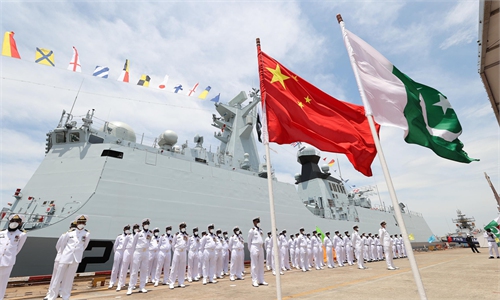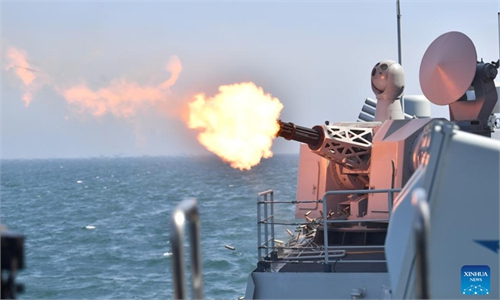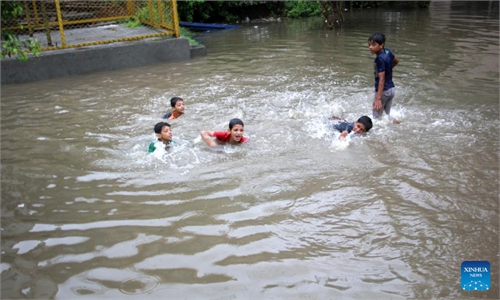BRI projects at Port of Gwadar Sea and Piraeus create new momentum for regional development and connectivity under a shared future
From Gwadar to Piraeus, the BRI exemplifies how global connectivity is strengthened
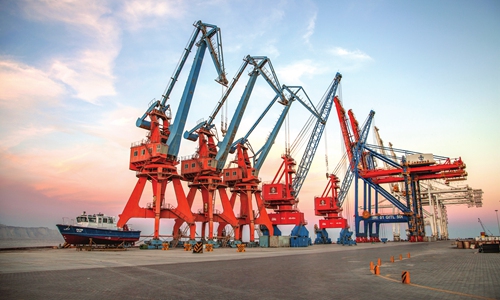
The Gwadar Port in Pakistan Photo: VCG
Editor's Note:
In 2013, Chinese President Xi Jinping put forward the "Belt and Road Initiative" (BRI), aiming at building a new platform for international cooperation and creating new momentum for shared development. Since then, the BRI has opened a path for high-quality development and common prosperity for countries along the route, becoming a real global platform serving over half of the world's population.
As part of the many BRI signature projects creating prosperity and sustainable growth for people under a shared future, Chinese companies' participation in the development of ports around the world, be it the Gwadar Sea Port in Pakistan or the Port of Piraeus in Greece, exemplified how Chinese investment, technology and operation, have injected new momentum into local economies and boosted greater connectivity in both their immediate regions and beyond.
This is the fifth in a series about a monumental decade for the BRI.
Sitting in one of the most underdeveloped regions of Southern Pakistan, where the economy is still developing, the climatic conditions are harsh, the Port of Gwadar Sea is located in a "Gobi desert" troubled by intermittent power supply, Zhang Baozhong, chairman of China Overseas Ports Holding Company (COPHC), recalled when he first arrived in August, 2015. Shocked by what he saw, the area has now transformed into one of the largest ports in Pakistan, and dubbed by the media as "Pakistan's Shenzhen," playing a key role not only in the economic and trade development of the country but also acting as an important hub under the Belt and Road Initiative (BRI) connecting the China-Pakistan Economic Corridor to the sea.
As part of the many BRI signature projects creating prosperity and sustainable growth for people under a shared future, the participation of Chinese companies financially and technically in the development of local ports, be it the Gwadar Sea Port in Pakistan or the Port of Piraeus in Greece, stands as living evidence of how Chinese participants have injected new momentum into local economies and boosted greater connectivity in both their immediate regions and beyond, government officials and business representatives said.
When Chinese companies are looking overseas to renovate underdeveloped ports, they have expanded their business globally while offering new possibilities for local ports with advanced facility upgrades, financial and technical supports, unleashing their greater potentials in the world trade.
The 'Shenzhen of Pakistan'
Before 2013, Gwadar port was in a semi-abandoned state, the terminal facilities were outdated, and operations were barely being maintained by the import of wheat and fertilizers designated by the Pakistani government.
In 2013, Zhang's company took over the port, and focused a huge amount of investment into recovering and upgrading port operations, including five new container bridge cranes, a new 100,000-square-meter storage yard, in addition to seawater desalination equipment.
The upgraded port has greatly lifted its shipping volume for international trade. On March 7, 2018, China Ocean Shipping Company COSCO Shipping Group (COSCO) launched a Karachi Gwadar Gulf Service, which regularly uses Gwadar Port. The opening of this route has fundamentally solved the situation of no commercial operation of Gwadar Port for more than 10 years after its completion, and greatly improved the shipping status of Gwadar Port in South Asia, according to media reports.
At present, the terminal can accommodate two 50,000-ton cargo ships at the same time, and can handle bulk cargo, containers and ro-ro cargo, with full operational capacity.
Chinese operated ports are not just about boosting the local economy and trade, but providing a substantive improvement to local living standards, creating new jobs and education opportunities.
For example, with the gradual development of Gwadar Port, enterprises joining the park within the free zone and the construction of the China Pakistan Economic Corridor projects around Gwadar have provided nearly 1,000 jobs for the local community while improving the economic opportunities for ordinary people.
Moreover, the expansion project of China-Pakistan Gwadar Faqeer Middle School funded by China Foundation for Peace and Development receives enrollment for nearly 600 children every year, providing them the best opportunities for learning in the local area, Zhang told the Global Times.
Due to the dramatic changes that Gwadar Port has created for the region, some media have dubbed it the Shenzhen of Pakistan. As someone who has lived and worked in the area for years, Zhang believes that the port is worthy of the name.
In 2018, Shenzhen's GDP was $370 billion while Hong Kong's came to $360 billion based on that year's official exchange rate, becoming the largest city in the Guangdong-Hong Kong-Macao Greater Bay Area in terms of economic aggregate.
"Just like Gwadar a few years ago, Shenzhen used to be an inconspicuous small fishing village...it is precisely because of good policies, a peaceful and stable social environment and the hard work of the people that it has realized today's remarkable achievements," Zhang said, extending his expectations for the future development of the port, especially in playing a bigger role in the international trade.
After nine years of construction and development, Gwadar Port can not only handle port business such as bulk carriers, containers, and LPG ships, but also link up business chains such as warehousing logistics and customs clearance services.
The joint development of the port area and the Gwadar Free Zone with the participation of Chinese companies has not only invigorated the local economy but actively promoted regional economic development through land and sea logistics by making full play of the geographical advantages of the port as the nearest sea outlet in Central Asia, Zhang said.
With the stabilization of the domestic security situation in Afghanistan, the Afghan transit entrepot trade has also become the main business of Gwadar Port.
Zhang said that, in the future, his company will further develop the access to the sea for Central Asian countries, and build Gwadar Port into an important port for the transit trade of Central Asian inland countries.
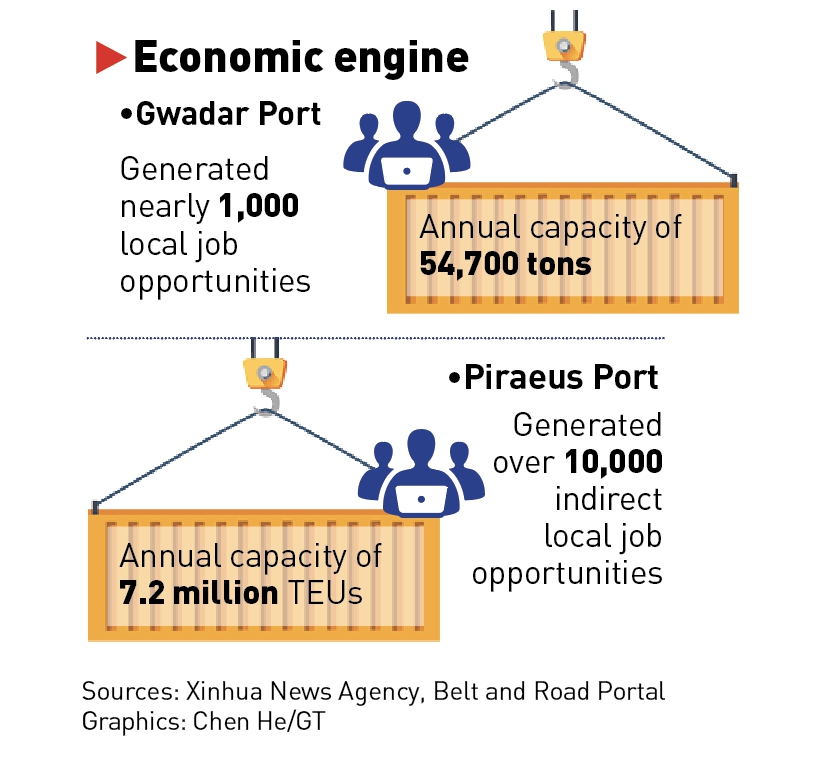
Graphics: Chen He/GT
The 'South Gate' prevails
If Gwadar Port serves the transportation upgrade to the East, the Piraeus Port, another signature project under the BRI, in Greece strengthens the connection to the West.
The port of Piraeus is the largest port in Greece and is regarded as Europe's "South Gate," playing an increasingly pillar role in supporting trade between the East and the West.
Evangelos Kyriazopoulos, secretary general of Ports, Port Policy and Maritime Investments of the Greek Ministry of Maritime Affairs and Insular Policy, contributed the follow-up achievements the cumulative result of COSCO's 1-billion-euro ($1.02 billion) investment in the port of Piraeus since 2016.
Only four years after the signature of an MOU to build further on the BRI, Port of Piraeus is now the leading port in the Mediterranean in terms of container transportation and the fifth in the EU, Kyriazopoulos said in a recent written interview with the Global Times.
On June 12, 2008, COSCO successfully won the bid for the privatization of the Piraeus Port Container Terminal in Greece, and obtained a 35-year franchise right for the terminal. The economic benefits of the terminal and its function as a major European port have gradually emerged.
Since COSCO began running the port, the increase in freight from the Far East has contributed to more than 80 percent of the port's growth, according to media reports.
For the China-Europe route, this natural deep-water port is the geographically closest and most cost-effective supply and transshipment hub base for container ships after passing through the Suez Canal.
Containers can either be reloaded in Piraeus on more economical medium-sized container ships and continue on to Northwest Europe, or they can be unloaded on-site and transferred directly to the hinterland of continental Europe via the Balkan rail network.
In 2021, the Greek port of Piraeus achieved the highest revenue and throughput growth in its history, at a time when the port played an increasingly important role in Asia-Europe shipping.
Among the most remarkable results created by partnership at Piraeus port is the fact that COVID-19 outbreak instead of affecting bilateral trade volume (as it was the case in many competitive ports worldwide), it managed to enhance regional connectivity and bring forward green projects, as well as to boost investment plans for increasing goods trade volume to enrich bilateral business ties in the coming years, Kyriazopoulos said.
Since the launch of the express train from the port to Central and Eastern Europe, as part of the China-Europe Land-Sea Express Line, the delivery time to Budapest and neighboring destinations has already been shortened to 7-10 days compared with traditional routes, according to the secretary general.
On October 25, 2021, COSCO completed the acquisition of a 67 percent stake in the Piraeus Port authority. So far, the Chinese company has created more than 3,000 jobs directly and more than 10,000 indirectly, and has brought direct social contributions of more than 1.4 billion euros to the local area.
In recognition of the achievements made so far to the port development, Kyriazopoulos noted that "on our part in the Ministry, we are steadily committed to support the implementation of the large-scale investment plan, joining efforts to swiftly perform all necessary amendments required to support the continuous development of this transport line and develop end-to-end supply chain services."
"It is our belief that this cooperation would become even more productive and effective for Europe, as soon as COSCO's investment plan will be concluded," Kyriazopoulos said.
